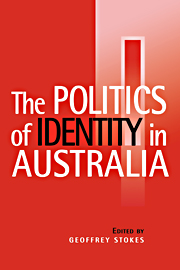Book contents
- Frontmatter
- Contents
- Acknowledgements
- Contributors
- Introduction
- Theorising Identity
- 1 Situating Australian National Identity in Theory and Practice
- 2 ‘Other Times’: Thatcher, Hawke, Keating, and the Politics of Identity
- 3 Universal Obligations: Liberalism, Religion and National Identity
- Gender and Sexuality
- Race, Place and Citizenship
- Culture: Literature and Film
- References
- Index
2 - ‘Other Times’: Thatcher, Hawke, Keating, and the Politics of Identity
Published online by Cambridge University Press: 05 June 2012
- Frontmatter
- Contents
- Acknowledgements
- Contributors
- Introduction
- Theorising Identity
- 1 Situating Australian National Identity in Theory and Practice
- 2 ‘Other Times’: Thatcher, Hawke, Keating, and the Politics of Identity
- 3 Universal Obligations: Liberalism, Religion and National Identity
- Gender and Sexuality
- Race, Place and Citizenship
- Culture: Literature and Film
- References
- Index
Summary
Australian analyses of mainstream economic and political discourse during the Labor period of office 1983–96 have tended to pay relatively little attention to the codes, images, meanings and concepts of personal identity evoked by Australian Labor rhetoric. That is, they have not examined the leaders' own projections of personal identity, or the (often related) forms of personal identity they appealed to among the electorate (see e.g. Maddox 1989 and Jaensch 1989). Yet, this is an important area if one wishes to understand some of the ways in which individuals can relate to, and identify with, public political discourse.
It is a sphere in which everyday life meets the discourse of party politics; where people can find that government rhetoric melds with personal experience; where both agreement and resistance can be generated. It is a crucial aspect of political legitimation. Australian work, arising from the field of cultural studies, provides useful analyses of political images and meanings during this period but generally overlooks issues of personal identity. For example, Meaghan Morris' insightful Ecstasy and Economics centres around (the then) Treasurer Paul Keating's use of economic discourse (Morris 1992). Another example is the work of Graeme Turner, which also draws on cultural studies frameworks to analyse images and meanings in the context of national identity but tends to neglect issues of personal identity (Turner 1994).
By contrast, there is a rich British literature, frequently coming out of cultural studies, which attempts to analyse the codes, meanings and images associated with both the Conservative governments and the British Labour Party.
- Type
- Chapter
- Information
- The Politics of Identity in Australia , pp. 37 - 49Publisher: Cambridge University PressPrint publication year: 1997
- 3
- Cited by

